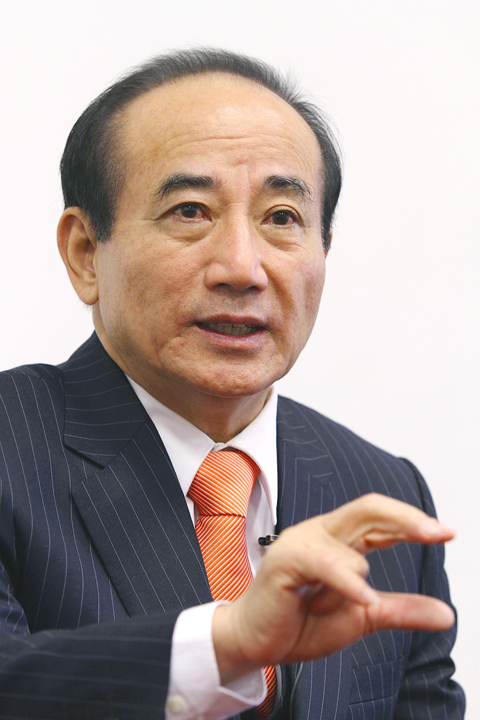A broad trade pact between Taiwan and China could be set back as legislators review and possibly overrule it, Legislative Speaker Wang Jin-pyng (王金平) said yesterday.
Taiwan’s polarized legislature could ask the government to change an economic cooperation framework agreement (ECFA) with China, which is expected to take the form of a free-trade-style deal that would lower tariffs in hundreds of sectors, Wang said.
The government has said it hopes to sign the agreement at a formal meeting with Beijing officials early this year. The deal is expected to open trade links between Taiwan and other Asian economies.

PHOTO: STEVE CHAN, REUTERS
“We can’t change the content of [an] ECFA, but we can overrule it or support it,” Wang said in an interview.
If the legislature overrules the pact, he said, legislators would ask the government to redo parts of the deal.
Some in Taiwan fear the pact would allow an unwelcome flood of Chinese goods into Taiwan’s economy. Their opposition could pressure legislators to take action.
“After it’s signed, does it affect the country’s sovereignty, and secondly is there anything that harms national security?” Wang said. “And will it create any impact on people’s rights and interests? We will evaluate it according to these criteria.”
The legislature hopes to spend more than a legal limit of one month to deliberate the deal after the two sides initially sign it, he said.
“If Taiwan doesn’t sign an ECFA with China this year, our competitiveness of course will be weakened, but that doesn’t go as far as saying we won’t survive,” Wang said.
Taiwan has floated to China a confidential list of 700 to 1,000 items for tariff revisions under an ECFA, subject to negotiations, analysts said.
Reports say Taiwanese officials have sought aggressive tariff cuts for textiles, machinery and petrochemical products.

Alain Robert, known as the "French Spider-Man," praised Alex Honnold as exceptionally well-prepared after the US climber completed a free solo ascent of Taipei 101 yesterday. Robert said Honnold's ascent of the 508m-tall skyscraper in just more than one-and-a-half hours without using safety ropes or equipment was a remarkable achievement. "This is my life," he said in an interview conducted in French, adding that he liked the feeling of being "on the edge of danger." The 63-year-old Frenchman climbed Taipei 101 using ropes in December 2004, taking about four hours to reach the top. On a one-to-10 scale of difficulty, Robert said Taipei 101

Nipah virus infection is to be officially listed as a category 5 notifiable infectious disease in Taiwan in March, while clinical treatment guidelines are being formulated, the Centers for Disease Control (CDC) said yesterday. With Nipah infections being reported in other countries and considering its relatively high fatality rate, the centers on Jan. 16 announced that it would be listed as a notifiable infectious disease to bolster the nation’s systematic early warning system and increase public awareness, the CDC said. Bangladesh reported four fatal cases last year in separate districts, with three linked to raw date palm sap consumption, CDC Epidemic Intelligence

Two Taiwanese prosecutors were questioned by Chinese security personnel at their hotel during a trip to China’s Henan Province this month, the Mainland Affairs Council (MAC) said yesterday. The officers had personal information on the prosecutors, including “when they were assigned to their posts, their work locations and job titles,” MAC Deputy Minister and spokesman Liang Wen-chieh (梁文傑) said. On top of asking about their agencies and positions, the officers also questioned the prosecutors about the Cross-Strait Joint Crime-Fighting and Judicial Mutual Assistance Agreement, a pact that serves as the framework for Taiwan-China cooperation on combating crime and providing judicial assistance, Liang

US climber Alex Honnold left Taiwan this morning a day after completing a free-solo ascent of Taipei 101, a feat that drew cheers from onlookers and gained widespread international attention. Honnold yesterday scaled the 101-story skyscraper without a rope or safety harness. The climb — the highest urban free-solo ascent ever attempted — took just more than 90 minutes and was streamed live on Netflix. It was covered by major international news outlets including CNN, the New York Times, the Guardian and the Wall Street Journal. As Honnold prepared to leave Taiwan today, he attracted a crowd when he and his wife, Sanni,